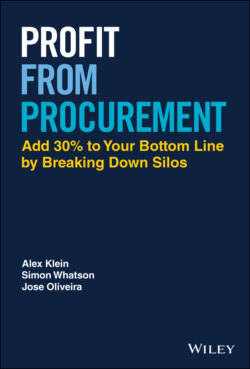Читать книгу Profit from Procurement - Jose Oliveira Valentede - Страница 17
Walk, Then Run
ОглавлениеWhat I learned from that exchange confirmed to me what I have seen throughout my career as a Procurement consultant. Namely, many CPOs and Procurement professionals aspire to be something other than people who save money. That is excellent, because there is certainly more to Procurement than saving money, but much care is needed.
The people on this panel were successful CPOs with mature Procurement functions, and each of them had established themselves in their respective businesses and earned the right to go beyond savings in pursuit of more corporate value. However, in public these days, even these people throw in the savings piece as a bit of an afterthought, as if it isn't important, like the first two speakers on the panel. And this is the wrong message.
This is a peculiar state of affairs. After all, didn't Procurement initially exist to be the commercial conscience of its organization? The answer to that is: yes, it did. When companies realized just how much of their spend was going to third parties, they saw an opportunity to professionalize the way they purchase—to generate synergies and to remove cost.
As we saw in the previous chapter, it was the auto companies that were first to the party but almost every other industry since has set up Procurement functions to help their organizations spend money better and more efficiently. As some Procurement functions became more advanced, they earned the right to expand their remit and justifiably so.
But we have seen many examples of CPOs trying to skip the step of establishing themselves as effective savings CPOs, going straight to attempting to claim ownership of all sorts of different areas that have little to do with savings. If your CPO has a vision for his or her department, how much of it were you expecting to be in there? The chances are if there are any surprises, your CPO is probably trying to run before they can walk.
CPOs need to be realistic about their starting point and the need to walk first, exactly as the supermarket CPO on our panel said. Being recognized and respected as the commercial conscience of the organization is paramount; it's the main event. And why wouldn't it be?
As we explain in this book, and indeed the very first chapter, Procurement can boost profits by a whopping 30%, or more in an organization where it's done really well. This is why the Procurement function exists first and foremost and, unless a Procurement function is already achieving that 30% boost, it needs to retain that as the single biggest priority in the ambition.
It's worth clarifying at this point what we mean by savings. Put simply, it is ensuring the company is getting better value from the supply market. It is not restricted to price reduction, though that certainly is a saving. It can (and must) also include savings on total cost—for example, you buy a more expensive part that lasts longer, thus costing less over the life-time of a product that costs less but doesn't last as long—and even cashflow improvements, if cash is important to the company. We go into more detail on savings and how to track them in Chapter 9: Savings Realization.
The difficulty of understanding your starting point is compounded by the fact that Procurement functions can sometimes think they are better than they really are. And this is not because they are arrogant in general, it's because they have a different understanding of what Procurement is achieving in their company today than most of their peers in other functions.
For example, Procurement often quotes savings figures it has delivered when asked about achievements, but how much of these savings are believed by the rest of the company? That is critical. Without that common understanding, the savings will not give you credibility. And if a Procurement function aspires to pursue other causes than savings, it needs to be credible on savings first.
But it's not all Procurement's fault. If Procurement tends to overvalue itself, then companies also tend to undervalue Procurement. But, unfortunately, it's up to Procurement to redress that balance.
In fact, to truly understand the starting point, it's necessary to know what value the business currently ascribes to Procurement.
What are they expecting Procurement to deliver?
What Procurement ultimately wants to deliver doesn't really matter until it can firstly deliver what the business wants, and that is usually a commercial benefit to the business. So, one of the most crucial things a CPO can do when setting the ambition is aligning that starting point with peers and stakeholders.
As our supermarket CPO said, delivering from that starting point gives you the credibility to expand your mandate and remit and go further than just savings.
